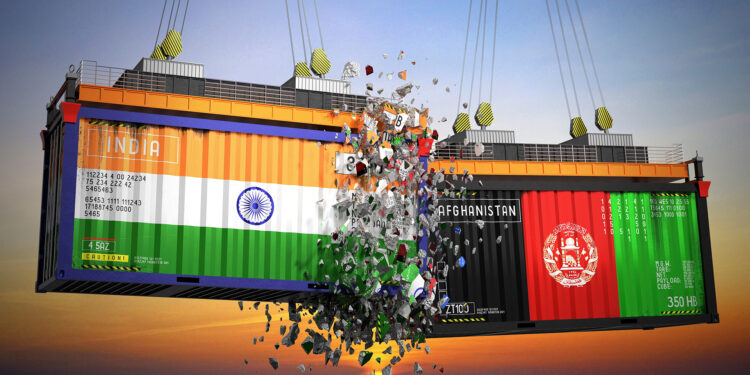Al -Jazeera Net Correspondents
Pakistan closed its important trade borders with India through the Atari-Waga crossing for the second time in 6 years, which led to the suspension of Afghan exports to India and the presence of obstacles to importing goods from them. While tensions between the two nuclear neighbors, (India and Pakistan) escalate Afghanistan, finds itself a heavy economic price for a conflict that does not participate directly.
Khan Al-Kozi, a member of the Board of Directors of the Afghan Chamber of Commerce and Investment-to Al-Jazeera Net-said that the closure of the Atari-Waga crossing between Pakistan and India “led to the suspension of trade” with New Delhi.
“These limits are the least expensive for Afghan exports to India, where about 80% of Afghan exports, especially dried fruits, are transferred to Indian markets. This is not the first time that the crossing was closed to Afghan trade due to the tensions between Islamabad and New Delhi.”
Historical relations are threatened
The Atari-Waga crossing, which was opened in 2005, is a major path of trade not only between Pakistan and India, but also between Afghanistan and India across Pakistani territory. This crossing has witnessed many fluctuations in recent years due to bilateral tensions, yet India has continued to import goods from Afghanistan even during the rule of the first Taliban (1996-2001).
Trade size between Afghanistan and India
- The volume of bilateral trade between Afghanistan and India reached 997.74 million dollars, which represents only 0.09% of the total foreign trade of India.
- After the Taliban arrived in power in 2021, India’s imports from Afghanistan rose to a record level of $ 642.29 million.
- India’s exports to Afghanistan have declined to 355.45 million dollars, its lowest level in the past 16 years.
As tensions escalated in the disputed Kashmir region, the future of trade between Kabul and New Delhi remains mysterious, as the closure of the only land crossing dedicated to exchanging goods between the two parties remain serious concerns about regional stability. This has increased pressure on small companies and industries that depend on goods imported from India.
“If the current situation continues, merchants will have to search for alternative roads, although they are not economic or short like the Waga road. Alternatives are expensive and take a long time and fresh fruit and vegetable merchants are currently incurring heavy losses, and they are considering using other ways to continue their business,” economist Shaker Qayoumi told Al -Jazeera Net.
Alternatives face challenges
In 2019, the Indian government led by Prime Minister Narendra Modi issued a presidential decree canceling Article 370, ending the special situation of the Kashmir region. This caused the severing of trade relations with Pakistan, prompting Afghanistan to search for alternative ways to maintain its trade relations with India, so the former Afghan government went to use the Iranian port of Chabahar and open a direct air corridor.
“India has invested in the Iranian port of Chibhar to reduce its dependence on the Pakistani road,” former Afghan Finance Minister Anwar Al -Haq Uhudi told Al -Jazeera Net. It is a good choice for trade between Kabul and New Delhi, but it faces restrictions due to international sanctions imposed on Iran, as well as many international banks refrain from dealing with Iranian banks.
“Trade exchange is going through a real crisis, and the closure of the borders may lead to greater paralysis in the movement of trade,” he added.
India is one of the most important Afghan export markets, as it imports the following:
- Nearly 90% of its needs of dried figs.
- 50 %of saffron and dried apricots.
- In addition to carpets and medicinal herbs, all of these commodities often pass through the Atari-Waga crossing.
It is estimated that this closure will lead to a significant decline in the volume of trade between the two countries in the coming months, especially since Afghanistan relies heavily on this way to import basic goods from India.
A spokesman for the Afghan Ministry of Commerce, Abdel Salam Jawad-to Al Jazeera Net-stated that the closure of the Atari-Waga crossing “not only affects Afghan trade, but also a heavy blow to India, as the prices of dried fruits in Indian markets increased by 20%.
He added, “The volume of trade between the two countries reached 703 million dollars during the first ten months of 2024, of which 541 million Afghan exports and 222 million imports are. Most dried fruits are exported through this crossing, and its closure disrupts vital supply chains.”
A diplomatic vision amid conflict
Trade relations between Afghanistan and India are one of the oldest relations in the region, and its roots go back to ancient times, as Kabul played a strategic role in linking the Indian subcontinent to Central Asia through trade routes. Despite the repeated geopolitical challenges, these relationships continued at a relatively stable pace.
Today, Afghanistan depends in its trade with India 3 tracks:
- Atari-Waga crossing.
- Chabahar port.
- The air passage that was opened in 2019.



